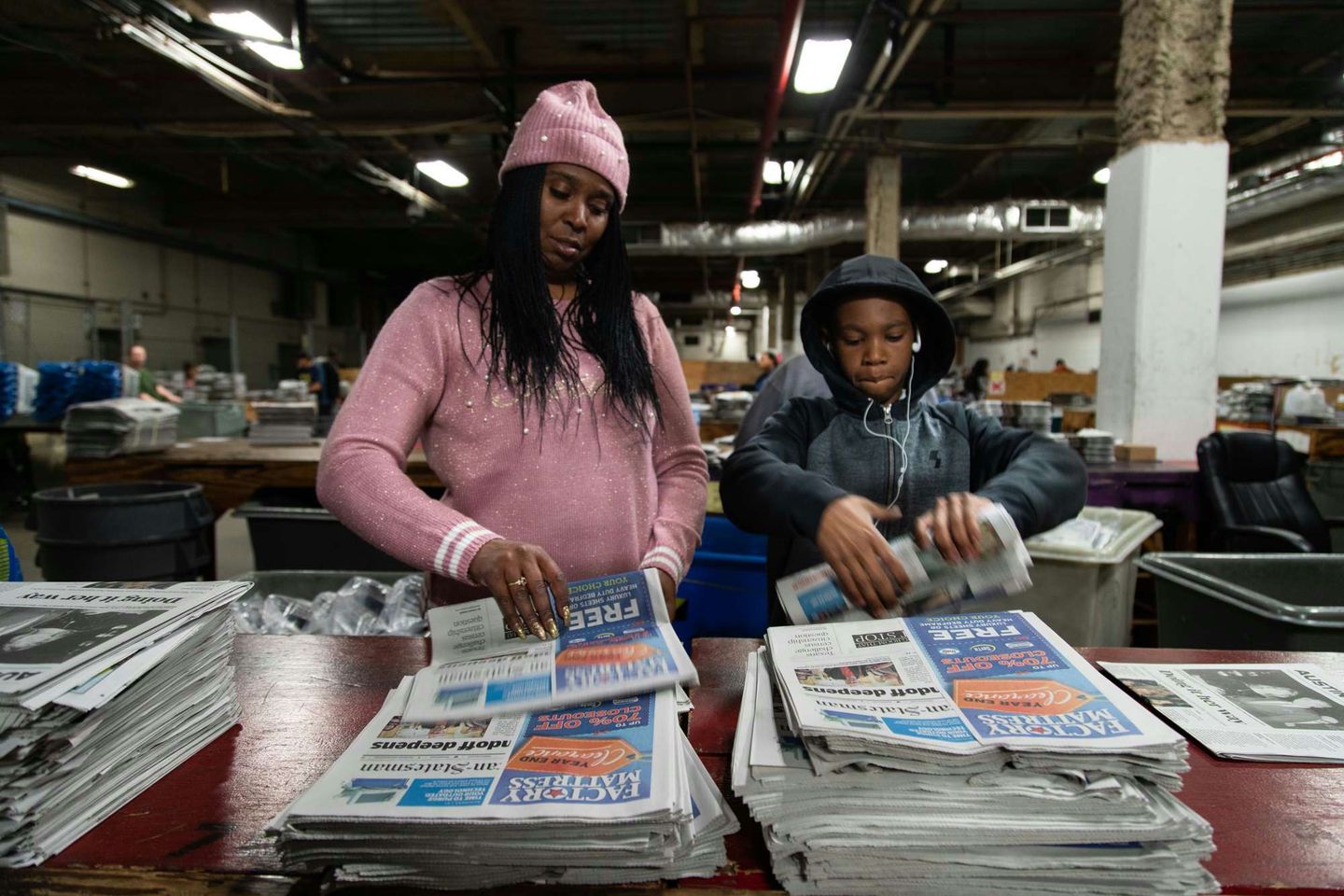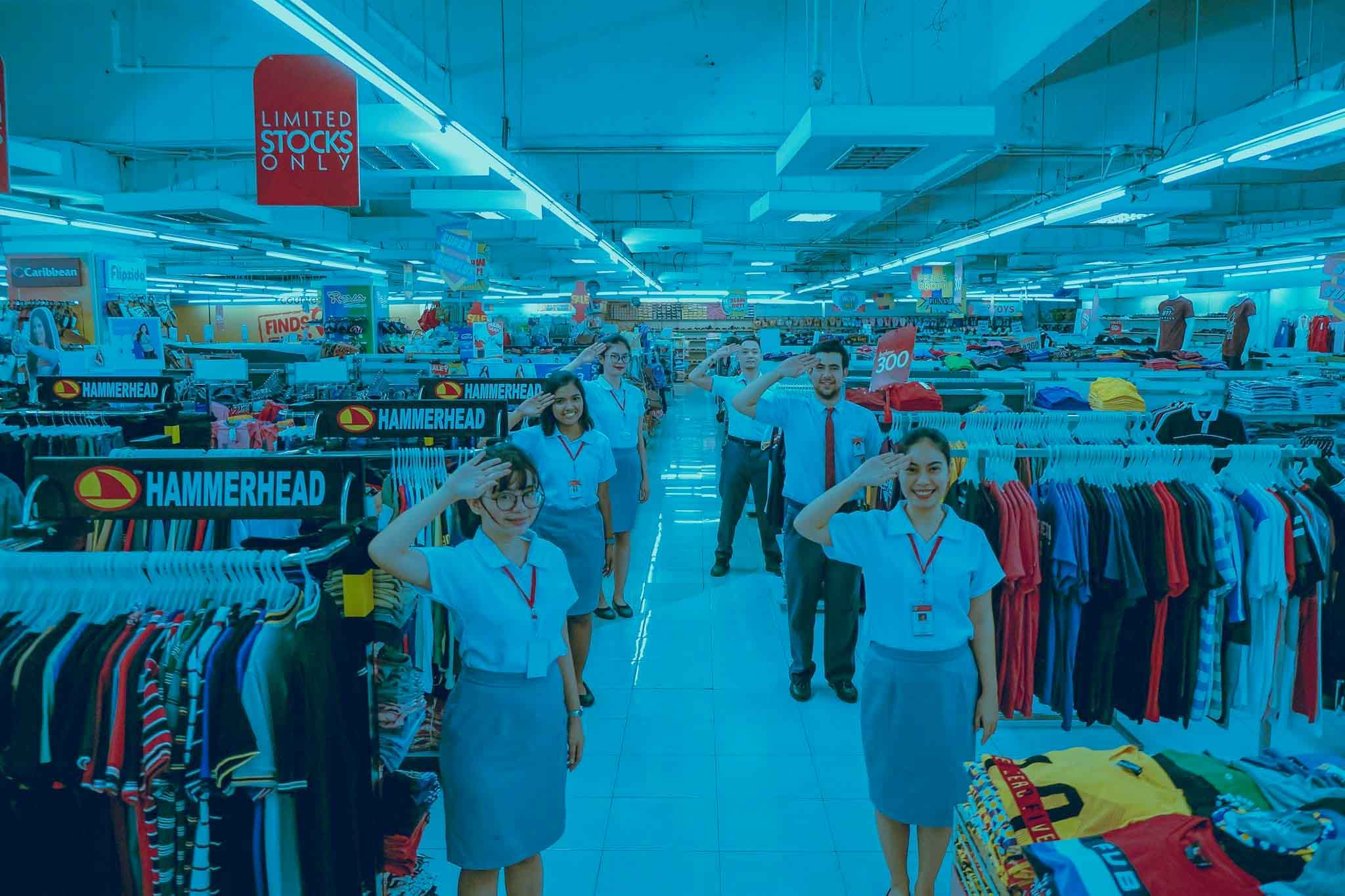Christmas Cards From A Worker In Austin
Let Me Exploit You: Short Films On Exploitative Working Conditions
CinemaAttic’s holiday programme touches on “sustainability, colonialism and some other lovely consequences of the fast-paced life we like to live”.

CinemaAttic, an independent film exhibitor based in Edinburgh, does not want you to sit back and relax during the opulence of Christmas time. Instead, it’s time to consider the production chain of that brand-new pair of socks your grandmother just gifted to you. For their December event aptly named “Let Me Exploit You”, CinemaAttic has selected “a festive programme touching on sustainability, colonialism and some other lovely consequences of the fast-paced life we like to live”: a challenging selection of films that aims to map out the baffling impurities of our current age and the wicked economic systems we’re caught in.
Ivete Lucas’ remarkable split-screen chronicle of a newspaper carrier’s Christmas Eve gets the ball rolling. In Happiness is a Journey (2021), Lucas, a Brazilian documentary filmmaker based in Austin, Texas, registers the hustle and bustle of a warehouse that’s open 365 days a year—and therefore requires its workforce on a similar basis. While newspapers get tied together, we believe to witness playfulness with the presumed offspring of one of the independent contractors. Later, more children show up in the building, helping their elders. At first glance, this doesn’t feel dystopian at all, as Lucas takes her time soaking up the textures of the workplace on both screens. This here is a colourful gang of colleagues of all races, sexes, and ages moving through a highly personalised working environment, donned with toys and posters and a wide array of Monster-cans. Though it, of course, seems reasonable to dress up your place of business if you spend your waking hours inside it (and even some of your dormant ones, as a napping workman proves.) More so if you make twenty-two cents per newspaper delivered, no benefits.
At first, the choice for a split screen is unclear. Once the film changes its focus to one of the workers–an old, raggedy bearded fella, Europeans would label a redneck all too quickly–it’s clear the technique is applied not only for maximum immersion but to place the individual within a broader context and environment. Yet when the film leaves the distribution plant to follow our protagonist, christened Edie “Bear” Lopez, on his round to deliver the newspaper from his ramshackle pickup truck, the split-screen technique is revealed to be an apparatus for the filmmaker’s humanism. The method amplifies different perspectives, which feels all the more urgent given the workers and their labour largely go unnoticed by society. Additionally, by prioritising the collective workforce over the individual in the first part of the film, the second part gains a moving quality. Sure, Edie “Bear” Lopez and his trembling chihuahua are a pair of loveable misfits working the grind, and the respectful manner in which Lucas follows them around communicates a social engagement. Concurrently, it elicits a certain inquisitiveness in the audience: What about the lives of the other faces we saw in the warehouse? The final title card declares Bear hasn’t missed a day of work for twenty-one years. Stuck in a capitalist carrousel, we know his homecoming doesn’t suggest an end, but a temporary repose before heading back to work.
Alberto Valverde and Rafael Cueto, CinemaAttic’s programmers, reinforce this idea of gloomy circularity by following up Lucas’ documentary with Pablo Polledri’s audience-friendly animation film Loop (2021). Its conceit is simple: Polledri dishes up a collection of zany vignettes frozen in endless repetition. Cars are forever spinning on a highway shaped like a lemniscate, a carpenter and a blacksmith are working their tools synchronically, and fascist-like police march in step. Mutating into a pulsing techno beat, it becomes a rhythmic nightmare of uniformity, all observed from afar by a faceless totalitarian overlord. Until a young woman decides to break the mould and hits the brakes to pick up a male hitchhiker. Something unexpected blossoms between the couple, not to the liking of the maleficent despot. In the ensuing chase, the fleeing sweethearts derange the oppressive society. It is uncertain whether the lovers can escape this pastel-coloured dystopia, though Polledri seems to suggest love is the one thing that can help humanity rise above the systems in place. There is always hope on the horizon: an affirmation that rings loud and clear in both the third and fourth films of the programme, in which Brazilian filmmakers Leonardo Martinelli (Neon Phantom) and Nina Kopko (Lunch Break) transcend Polledri’s somewhat naïve idea of romantic love as a means to fight the powers, to move towards the formation of a class consciousness.

Happiness Is A Journey (Ivete Lucas, Patrick Bresnan, 2021)
Much has been written on Leonardo Martinelli’s Golden Leopard-winning musical Neon Phantom already, including an enlightening piece by programmer and critic Sanne Jehoul here on Talking Shorts. Devoting itself to the struggle and plight of food deliverers, a disposable workforce enduring increasing systematic exploitation and lamentable working conditions, the film’s place within the programme demands no explanation. This generous film could easily be seen as the central pillar around which CinemaAttic’s programmers have constructed their curatorial endeavour to highlight the dehumanising immoralities of “profit and progress”. Because Martinelli’s message is straightforward and his aesthetics seem TikTok appropriate, the film is easily digestible, yet not any less intelligent or original. By giving a voice to the voiceless, and staging wonderful choreographies, Martinelli manages to make the fantastical crash into the social reality of protagonist João and his so-called “colleagues”. It results in lamentation: an emergence of a united workforce standing up for their rights. Until their song is cut short.
In the past, similar songs of revolution have been written. Nina Kopko’s 2021 Lunch Break, set in 1979, zeroes in on a group of women who must spend their lunch breaks in the toilets of a factory. Shot from intimate angles, with a DV camera that imparts their grimaces and protests with a smudgy, pixelated look, the four women Kopko introduces hold radically different perspectives. Their impromptu make-believe radio show gets interrupted by the real world: outside, their male colleagues are organising a strike. Should they join? Or would that mean the end of their employment? A debate arises. Kopko cuts up the short by focussing on the different women’s life stories, recited through voice-over, and sometimes foreshadowing their tragic passing or conformation. A myriad of trauma unfolds, its grief only mitigated by a feeling of togetherness. In the end, we are reminded these women existed and took part in the famous 1979 São Paulo ABC strike, spearheaded by current president-elect Luiz Inácio “Lula” da Silva. Yet, as the past has taught us, these female workers were forgotten. Iconic photos of men made history, while the names of Irene, Joana, Renata, and Miriam got side-lined. Thanks to Kopko, someone sings for this unsung sisterhood, at last.
Showcasing the exploited managerial class and highlighting its brash comprehension of the rigged and unfair system, Excuse Me, Miss, Miss, Miss (2019) by Sonny Calvento exposes the transgressions of the retail economy. While its Filipino brand of farcical comedy (satirical elements, absurd overacting, farts) feels tonally out of place within the larger programme, its inclusion seems evident. Taking place in a large shopping centre—“Trendysitas, a trendy mall for all,” the opening jingle reminds us—we follow Vangie, a tired salesperson. She gets checked by her supervisor, because, as is made clear, “yawning is bad for business.” The long hours are too much to take. But, as Vangie reminds us in a fourth-wall-breaking moment, which is less intended as a Brechtian distancing device than just a straightforward comedic touch, she really needs the job. She just can’t seem to get her head around the remarkable tirelessness of her superintendent. The punchline of Calvento’s film arrives as a surreal plot twist: the tyrannical manager appears to be four identical people, hence her lack of exhaustion.

Excuse Me, Miss, Miss, Miss (Sonny Calvento, 2019)
Similar to the transition from Polledri’s Loop into the two Brazilian short films, the programmers shift their investigative focus from the micro to the macro level when following up the quirky Filipino comedy with the essay film Listen to the Beat of our Images (2021). While Calvento shows the individual adapting to (ludicrous) conformity, sibling filmmakers Audrey and Maxime Jean-Baptiste present the annihilation of a community through expropriation and resettlement in the name of progress. This quiet film is stark in contrast with the candy-coloured hyperbole of Excuse Me, Miss, Miss, Miss, which makes its painful candour all the more tangible. Outlining the history of the construction of a space centre by France in French Guyana through a careful assembly of archival footage, interviews, narration and black screens, the film evokes the ghosts of a forgotten place. The film’s origins are found in a call by France’s National Centre for Space Studies, CNES, which sought filmmakers to make a film using the centre’s archives. Cleverly and ethically working with the available materials, they made strict decisions on which images to use, and which to exclude. The frequent use of grainy blackness covers up for what was left on the cutting floor: shots of the destroyed villages that had to make way for the state-of-the-art spaceport. This method of appropriating archival material results in a radical way of looking at the colonial project; it could be argued that what we’re seeing (and more importantly, imagining) is a decolonizing effort in the end.
Ending on some kind of resolution, be it a dire one, conveys CinemaAttic’s damning view on the capitalist hellscape we have entered in the 21st century. The image of a space rocket hurtling towards unexplored space suggests further expansion, exploitation, and, ultimately, annulation. Despite its downbeat sentiment, “Let Me Exploit You” is an inspired programme mixing humour and sharp examination. What it perhaps lacks in on-the-ground militant cinema, it makes up for in intelligently sequencing the films to dialogue with each other. Both Brazilian shorts shine a light on the invisible and emphasise the importance of constructing a collective consciousness, while ‘Happiness is a Journey’ and ‘Listen to the Beat of our Images’ expertly paint the abstract “evils of the system” with fine brushes. Travelling from the United States to Brazil, the Philippines and French Guiana, the programmers have managed to gather a geographically diverse selection of films that speak to the distressing times we live in. All of them are equally imbued with a mix of hope and despair. The programme may not go down easy during your cosy Christmas dinner, but hey, don’t forget Edie “Bear” Lopez is hauling newspapers through town.

